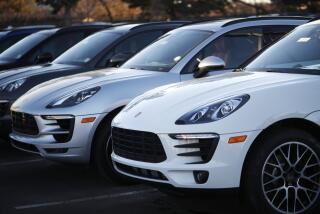L.A. Auto Show: Luxury brands push downmarket with SUVs

The LA Auto Show is the first time North American audiences will get a chance to see the Jaguar C-X17 crossover concept in person.
Names like Porsche, Jaguar, Mercedes-Benz and Lincoln bring to mind flashy cars with formidable pedigrees and even more formidable price tags.
But for the first time, all these storied luxury brands are focused on — of all things — compact crossover vehicles. Each is rolling out a new one at the Los Angeles Auto Show, which opens this week.
It’s not hard to figure out why: The segment’s market share has quadrupled in the last five years and is forecast to keep growing for the next five years.
PHOTOS: L.A. Auto Show model debuts
“It’s the sweet spot in the luxury market,” said Tom Libby, lead analyst at auto research firm R.L. Polk & Co. “A luxury make has no choice — they have to get into it.”
There’s no rigid definition for a compact crossover, but think of a hatchback with a hormone problem. Most are front- or all-wheel drive, and come with four- or six-cylinder engines, often turbocharged for better fuel economy and power. Budget $30,000 to $50,000 for luxury models.
Porsche will use the L.A. show for the world debut of the all-new Macan compact crossover. All-new models that will hit the market in 2014 include Lincoln’s MKC, unveiled last week, and Mercedes-Benz’s GLA, making its North American debut in L.A. Jaguar, meanwhile, is showing off a concept crossover that will probably reach production in 2016.
FULL COVERAGE: L.A. Auto Show 2013
The L.A. show opened to the media Tuesday and opens to the public Friday.
On the other side of the globe, Lexus was busy touting the LF-NX at the Tokyo Motor Show. Its concept hints at the shape a new NX crossover will take in the coming years.
And other luxury brands have compacts in various stages of development. BMW is already selling the compact X1 crossover. Audi has confirmed a Q3 crossover will be for sale this time next year.
Automakers eagerly eyeing this segment all say the buyers are coming from two distinct groups.
Baby boomers love them because they offer the luxury amenities they want in a more compact, practical size. Newcomers to the luxury world — often young families or single women — see them as a practical way to justify a pricey new vehicle.
The broad appeal of compact crossovers lies in their melding of the best attributes of passenger cars and SUVs. They offer the ride, efficiency and handling of a sedan with an SUV’s interior space and commanding view of the road. Because there’s no clear leader in the emerging segment, automakers are salivating at the prospect of a breakthrough product.
“This segment is blowing up right now,” said Andrew Frick, the head of Lincoln’s marketing. “ And it’s not being dominated by any one player. It’s very evenly spread out.”
Ford’s luxury division has only a few models to offer and badly needs a sales hit.
“This is one of the most important launches for Lincoln in recent memory,” Libby said.
The MKC is loosely based on the Ford Escape. Powered by one of two turbocharged four-cylinder EcoBoost engines, it will come in front-wheel-drive or all-wheel-drive configurations.
Base models will start at $33,995 and have a 2-liter power plant with 240 horsepower and 270 pound-feet of torque. Optional will be an all-new 2.3-liter turbocharged engine with 275 horsepower and 300 pound-feet of torque.
Across the hall at the L.A. show, Porsche will unveil its all-new Macan on Wednesday.
The Macan comes a decade after the brand sent sports-car purists into a rage with the mid-size Cayenne crossover. Those howls subsided when the Cayenne leaped to the top of Porsche’s sales charts globally, raking in cash the brand could reinvest in sports cars.
Now Porsche is unleashing the Macan S and Macan Turbo, which will be available for purchase in the spring.
“We clearly see it as important to position Porsche in this segment,” said Detlev von Platen, president and chief executive of Porsche North America. “We want it to be the most exclusive car in the segment.”
The starting price of $50,895 for the Macan S, with a 3-liter, 340-horsepower twin-turbocharged V-6 engine, is beyond what most shoppers want to pay. Yet the Macan is the most affordable Porsche, targeting first-time buyers to the brand.
The Macan Turbo starts at $73,295 and offers a 3.6-liter twin-turbocharged V-6 with 400 horsepower and capable of a zero-to-60-mph run in 4.4 seconds, 0.6 of a second faster than the Macan S. Both models will come standard with a seven-speed PDK automated dual-clutch transmission.
Porsche chose the L.A. Auto Show to unveil the budding Macan lineup for the same reason it’s always treated the L.A. show with respect: Roughly 18% of Porsche’s U.S. sales happen here — or about as much as Spain, France and Italy combined.
Porsche won’t be the only German automaker expanding its crossover lineup. Despite already offering the compact GLK and the mid-size ML crossovers, Mercedes-Benz is going even smaller.
“The opportunity is there, and every brand is looking at the same data we are,” said Steve Cannon, head of Mercedes-Benz USA.
His company will display the production-ready GLA250 that will go on sale in a year, and a concept GLA45 AMG. The entry-level GLA lineup will slot below the GLK, and it’s based on the new platform that underpins the tidy CLA sedan. This means the GLA250 will use a 2-liter turbocharged four-cylinder engine that puts out 208 horsepower and 258 pound-feet of torque.
Meanwhile, Jaguar will roll out a concept crossover that many expect to become a reality in 2016 or 2017. The C-X17 concept is built on an all-new platform that Jaguar will first use for a new compact sedan.
Both vehicles are a play to make Jaguar a competitive volume brand. In 2012, U.S. sales for Jaguar and sister company Land Rover were roughly one-fifth those of BMW.
“What’s clear is those brands that have crossover vehicles are the top players, from a volume standpoint,” said Jeff Curry, vice president for Jaguar’s U.S. division.
Jaguar — now owned by India’s Tata Motors — has a history of showing thinly disguised concepts at auto shows that hit the assembly line a year or two later. The F-Type Coupe that is also making its debut at the L.A. Show was first seen in 2011 as the C-X16 concept.
Though some Jaguar purists may impugn the idea of a crossover, one has only to look at Porsche’s rising fortunes to understand Jaguar’s motivation to evolve.
“Every brand is sharpening their definition,” Curry said. “Consumers want a really strong brand image, and that becomes kind of your secret sauce.”







